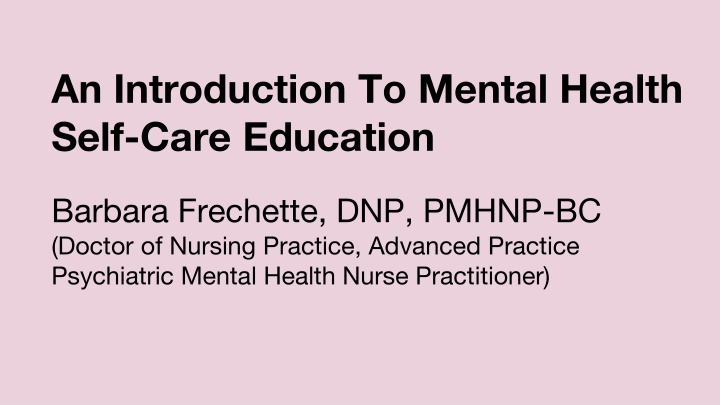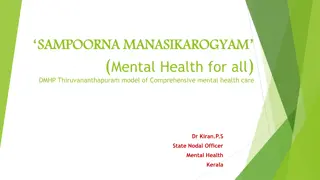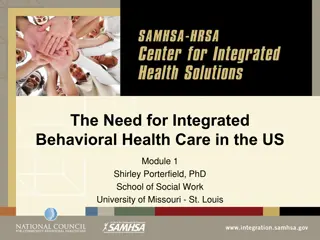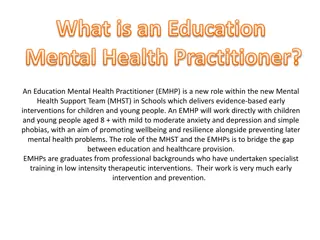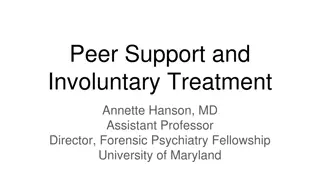Mental Health Self-Care Education: A Practical Approach
Explore a comprehensive mental health self-care education program designed by Barbara Frechette, DNP, PMHNP-BC. This approach emphasizes the importance of promoting learning through ongoing exploration and reflection, focusing on individual readiness to derive personal meaning. Discover how each mini-lesson encourages contemplation and discussion to enhance mental well-being. Remember the essential mental health needs of ableness and closeness, and learn how to care for your mind effectively.
Download Presentation

Please find below an Image/Link to download the presentation.
The content on the website is provided AS IS for your information and personal use only. It may not be sold, licensed, or shared on other websites without obtaining consent from the author.If you encounter any issues during the download, it is possible that the publisher has removed the file from their server.
You are allowed to download the files provided on this website for personal or commercial use, subject to the condition that they are used lawfully. All files are the property of their respective owners.
The content on the website is provided AS IS for your information and personal use only. It may not be sold, licensed, or shared on other websites without obtaining consent from the author.
E N D
Presentation Transcript
An Introduction To Mental Health Self-Care Education Barbara Frechette, DNP, PMHNP-BC (Doctor of Nursing Practice, Advanced Practice Psychiatric Mental Health Nurse Practitioner)
The mental health self-care approach that soon follows consists of two sets of lessons. The green set is for ages 12 and older and the blue set is for ages 5 and up. Each blue slide is a simpler version of the green one that precedes it.
The goal of guides using this approach is to promote learning by encouraging ongoing exploration and reflection. The pace at which learners progress is determined by their individual readiness to derive personal meaning.
Given each slide is a mini- lesson intended to prompt contemplation, we suggest guides relay and discuss only one or two of the slides per lesson.
Please be aware that, though not part of this introduction, biological factors are important to take into account when addressing mental health concerns.
The approach offered begins with the green slide that follows. Again, each green slide is paired with and followed by a simpler blue one.
Everyone has two basic must-have mental health needs. They re ableness and closeness.
We feel able when we accomplish, or succeed. Other terms used to describe ableness are autonomy, individuality and uniqueness.
You need to feel able to do things.
We feel close when we attach, or become involved. Other terms used to describe closeness are connecting, togetherness and belonging.
You need to feel close to someone.
We lose and regain some ableness and closeness throughout our lives.
You never stop needing to feel able and close.
Knowing good ways to feel able and close leaves you less likely to feel unsure, confused or worried.
Learning about feeling able and close is wise.
Because healthy people realize niceness is good for their mind, they rely on it to feel able and close.
Being nice is the best way to get what you need.
Niceness happens when you show kindness and fairness. Usually safe and reliable, kindness and fairness range from simple acts of civility to complex ways to cooperate.
You're nice when youre kind and fair.
Not being nice can be tempting, especially when being nice doesn't readily get a need met. So, it's important to understand why not being nice isn t healthy.
Being nice is always best, but not always easy.
For more background info on ableness, closeness, kindness and fairness, check out the premise section of the Niceology Instruction Guide. The Guide is located in the TEACHING menu at Outpost Oops.
Wise people keep learning about kindness and fairness.
When we lose something we value, hurt signals a need to regain the ableness or closeness we've lost.
People feel hurt when they lose something.
Trusting niceness puts us on a healthy path by providing the safety we need to learn from the hurt memories that follow our losses. Such learning lets us heal by improving how we get a need met.
Understanding your hurt can help you get hurt less.
Hurt memories trouble us until we heal.
Too often, we learn becoming hurt is a show of weakness rather than an opportunity to better understand how an attempt to feel able or close didn t go well.
Having hurt doesn't make you a wimp.
Remind yourself that, when appreciated, hurt prompts you to heal. It's human to hurt and heal.
Your hurt nudges you to get over a loss.
Healthy people are good healers. They learn from their hurt memories, and they stick with using kindness and fairness when replacing ableness and closeness.
You're wise when you get over your hurt by being kind or fair.
By eventually bolstering our self- esteem, social harmony and peace of mind, hanging-tough niceness justifies and strengthens our willingness to remain trusting.
Stay nice, even when someone isn't nice to you.
Not understanding and trusting our potential to heal puts us on an unhealthy path. We continue down this path by ignoring and storing our hurt.
Ignored and stored hurt doesn't fade. Instead, it becomes a long-lasting, unpleasant memory.
Hiding hurt doesn't make it disappear.
Hurt memories linger when distrusting niceness persists. They also leave us tempted to get ableness or closeness in unkind and unfair ways. These ways can make it hard for others to be nice to us.
Not being nice can cause others not to be nice to us.
If only allowed to occasionally give yourself one two-word piece of advise, make it this: Remain nice.
Anytime we pretend it's OK to feel able and close by being unkind or unfair, we make the healing needed to be healthy and happy less likely.
Not being nice always makes feeling good hard.
Given we don't have to heal to get by, we can let being kind and fair be unimportant for long periods of time.
People with much hurt often forget how helpful it is to be kind and fair.
